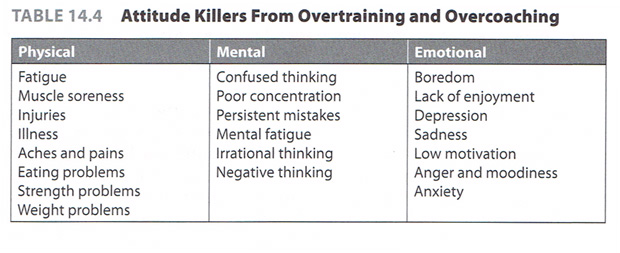| Monitoring Team Freshness |
| By: Bill Beswick
Originally Published in: One Goal – The Mindset Of Winning Soccer Teams Provided by: Human Kinetics All was well until a senior coach intervened and asked for more practice time on Friday. Under pressure the head coach relented and agreed. That's when the problems began. On the way to practice the weather changed for the worse, and the players were met with wet, cold conditions. Then the 45-minute practice became a 75-minute practice, and many players stood about for the final 30 minutes. I watched as the positive, high energy created on Thursday changed to low, negative energy (the bottom right-hand sector of figure 14.3). A strong emotional conviction about winning the game weakened. Players who knew on Thursday that they were ready were confused on Friday by the need for extra practice and an overload of information. Overtraining, overcoaching and mental and emotional confusion led to a poor performance — an own goal before the game had begun. The coaches got in the way of the team performance. Changes in attitude can be observed from changes in player behaviour. Table 14.4 indicates some of the changes that should alert coaches to the dangers of overtraining or overcoaching.
Coaches monitor their team's freshness, energy and emotional levels by following these pointers within their planned programme. 1. Setting an Example In physics, the definition of power is the rate at which work is done or energy is transferred. The most powerful coaches transmit a positive energy that fuels their team. Energy is infectious, so the coach must be a model of good energy. The coaching style and messages must give energy, be optimistic, confident and motivational and not take energy away by being pessimistic and demoralizing. 2. Inspiring With Ideas Achievement requires energy, and energy comes from emotion. Emotion is released by ideas, and ideas come from coaches, through optimistic, positive and inspirational messages. For example, planning and programming a short motivational team meeting can be a way of quickly reenergising the team. This has to be used sparingly and not become a routine activity. 3. Dealing With Defeat and Setbacks By staying optimistic, by educating rather than blaming and by interpreting a defeat or a setback calmly and positively, the coach is demonstrating role model behaviour that assists in building the emotional intelligence of the team. Pessimism and blame have a negative effect on team freshness. 4. Adjusting to Special Circumstances Planning to keep a team fresh throughout a season is based on the foreseen, likely programme of games. But the programme may change unexpectedly — an extended cup run, playoffs at the end of the season, a surprise invitation to a tournament and so on. To stay fresh despite these possible late additions, coaches should think creatively. • They can plan for their possible inclusion. (Coach Belichick of the New England Patriots always organizes his programme of work from the Super Bowl backwards.) • They can build a squad who can deal with the extra challenges. • They should create a can-do mindset in the team — a team that can play anytime, anywhere, in any conditions. • They can reschedule work, rest, recovery and relaxation to meet the special circumstances. |







